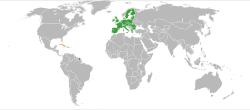- Cuba–European Union relations
-
Euro-Cuban relations 

European Union
CubaCuba–European Union relations are the international relations between the Republic of Cuba and the common foreign policy and trade relations of the European Union (EU).
Contents
EU's common position
EU relations with Cuba are governed by the Common Position, as approved by the European Council of Ministers in 1996, which is updated every six months following regular evaluations. According to the Common Position "the objective of the European Union in its relations with Cuba is to encourage a process of transition to a pluralist democracy and respect for human rights and fundamental freedoms, as well as sustainable recovery and improvement in the living standards of the Cuban people". Cuba rejects the Common Position as interference in its internal affairs. There is an EU Delegation in Havana that works under the responsibility of the EC Delegation in Santo Domingo, Dominican Republic.
Cocktail wars
In response to the Cason affair of March 2003, when the government of Cuba arrested dozens of journalists, librarians, and human rights activists, the EU took measures, which were publicly announced on 5 June 2003 to limit high level governmental visits. The EU reduced the profile of member states' participation in cultural events and invited Cuban dissidents to National Day celebrations. The Cuban authorities announced on 26 July 2003 their refusal of all direct aid coming from the European Union. This period of diplomatic friction became known as the Cocktail Wars.
On 31 January 2005, the EU decided that all the measures taken on 5 June 2003 would be suspended temporarily. The Council stated once again that the EU remains willing to maintain a constructive dialogue with the Cuban authorities aiming at tangible results in the political, economic, human rights and cooperation sphere. Furthermore, it decided that the EU will develop more intense relations with the peaceful political opposition and broader layers of civil society in Cuba, through enhanced and more regular dialogue. The temporary suspension of these measures was confirmed in June 2005.
Recent
On 11 May 2009, Czech Foreign Minister Jan Kohout, who represented the EU at a meeting with Cuba had stated that they had made no headway in Human Rights. Cuban Foreign Minister Bruno Rodríguez Parrilla defended Havana's record stating that the EU position was obsolete. Although the EU lifted economic sanctions against the nation in 2008, it reviews the situation annually.[1]
After the death of another dissident in Cuba in March 2010, the European Parliament put forward a resolution against Cuba and calling for the release of political prisoners. Meanwhile Spain, currently holding the EU Council presidency had been working to normalise relations, claiming that the common position had failed to produce change in Cuba.[2]
Trade
Cuba benefits from the GPS (Generalized Preference System) preferential treatment for its exports. Furthermore, despite being a member of the African, Caribbean and Pacific Group of States since 2000, Cuba does not benefit from the ACP-EU Sugar Protocol but from a sugar quota granted by the EU (some 59,000 tonnes per year; duty paid on this quota is EUR 98/t).[3]
The EU is Cuba's largest trading partner, accounting for a third of trade, half of foreign direct investment and more than half of all tourism. The EU also provided €4m in 2008 for humanitarian assistance given the impact of Hurricanes Gustav, Ike and Paloma, and in 2009 €36m for reconstruction, economic development, and environmental projects.[4]
References
 Foreign relations of Cuba
Foreign relations of CubaAfrica 
Americas Asia Europe Oceania Multilateral Related topics  Foreign relations of the European Union
Foreign relations of the European UnionBilateral relations Africa & ME Cape Verde · Iran · Iraq · Israel · Jordan · Lebanon · Morocco · Palestine · South Africa · Syria · Yemen
Americas Asia-Pacific Australia · China (People's Republic of) · Fiji · India · Indonesia · Japan · Nepal · North Korea · Pakistan · South KoreaEurope &
Central AsiaAlbania · Andorra · Armenia · Azerbaijan · Belarus · Bosnia and Herzegovina · Croatia · Cyprus (Turkish Republic of)† · Faroe Islands · Georgia · Iceland · Kazakhstan · Kosovo† · Liechtenstein · Macedonia‡ · Moldova · Monaco · Montenegro · Norway · Russia · San Marino · Serbia · Switzerland · Turkey · Ukraine · Vatican CityGeneral † = Disputed state, may not be recognised as an independent state by some or all European Union or United Nations members. ‡ Name disputed by Greece, EU recognises the Republic of Macedonia as the former Yugoslav Republic of Macedonia.Multilateral relations and initiatives Organisations Initiatives African, Caribbean and Pacific Group of States · Asia–Europe Meeting · Customs Union · Eastern Partnership · Energy Community · Euro-Latin American Parliamentary Assembly · European Common Aviation Area · European Economic Area · Euro-Mediterranean free trade area · Euromediterranean Partnership · Euronest · Economic Partnership Agreements · Neighbourhood Policy · Northern Dimension · Mediterranean Union · Stabilisation and Association Process · Association AgreementOrganisation Policy Common Foreign and Security Policy · Economic Relations · Everything but Arms · Security and Defence Policy · EnlargementActors ECHO · EuropeAid · External Action Service · Foreign Affairs Council · High Representative Catherine Ashton · Parliamentary Foreign Affairs Committee · Foreign Policy Instruments ServiceDiplomatic missions Military and security Initiatives Defence Initiative · Synch. Armed Forces Europe · Defence Procurement · Petersberg tasks · Helsinki Headline GoalStructures Political and Security Committee · Military Committee · Military Staff · Operations Centre · Security & Defence College · Defence Agency · Institute for Security Studies · Satellite Centre · Joint Situation CentreForces Categories:- Foreign relations of Cuba
- Third country relationships with the European Union
Wikimedia Foundation. 2010.
